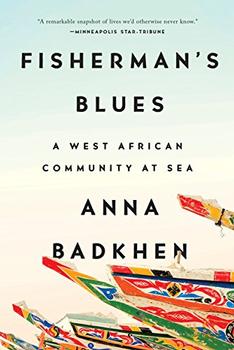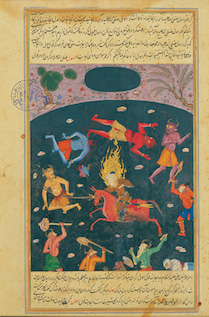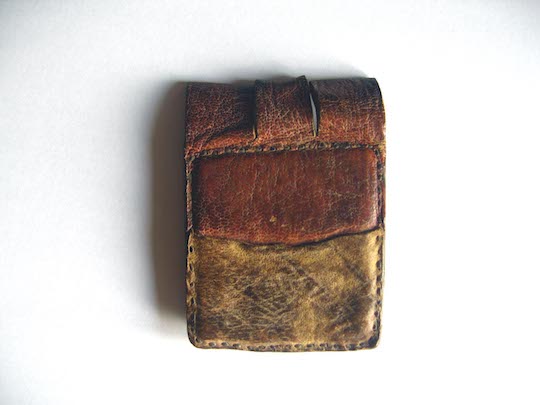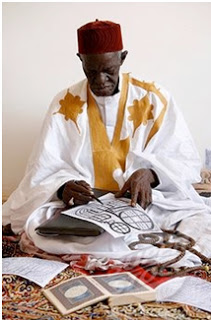Summary | Excerpt | Reviews | Beyond the Book | Read-Alikes | Genres & Themes | Author Bio

A West African Community at Sea
by Anna BadkhenThis article relates to Fisherman's Blues
 In Fisherman's Blues, Anna Badkhen takes us on a trip to the West African nation of Senegal. Although her primary focus is on the families who make their living in and around the ocean, another thread emerges - the fascinating stories of the jinn. The magical power of these equally magical creatures is described in stories of great success or misfortune, both at sea or on land, yet the jinn are also present in family life - they curse or bless children born to a specific house, they fall in love and even marry, they hold grudges and require appeasement. Possessing both superhuman strengths and very human weaknesses, these creatures present an interesting paradox, much like the region they inhabit.
In Fisherman's Blues, Anna Badkhen takes us on a trip to the West African nation of Senegal. Although her primary focus is on the families who make their living in and around the ocean, another thread emerges - the fascinating stories of the jinn. The magical power of these equally magical creatures is described in stories of great success or misfortune, both at sea or on land, yet the jinn are also present in family life - they curse or bless children born to a specific house, they fall in love and even marry, they hold grudges and require appeasement. Possessing both superhuman strengths and very human weaknesses, these creatures present an interesting paradox, much like the region they inhabit.
According to the Quran, God created the jinn as well as angels and humans: "I created the jinn and humankind only that they might worship Me." (Quran 51:56, Pickthall translation). Many believe they are real and that they co-exist with us in this world. At times jinn are mischievous, at others they are helpful. Much like humans, they are thought to have free will, they are born and they die, they are chock full of desires and ambitions. They are simply made of different material.
 The jinn easily found a home in Senegal. Not only because the nation is 96% Muslim, but also because when Islam arrived it found an existing tradition of animism and, instead of one driving out the other, the two intermingled to create something new and entirely functional. Animist belief is that the world is full of spirits, good and bad, helpful and harmful. The jinn of Islam, therefore, make perfect sense.
While they rarely take human wants into consideration, artfully created gris gris (pronounced gri-gri) - amulets designed for a very specific purpose – are believed by many to have the power to sway or appease these willful beings.
The jinn easily found a home in Senegal. Not only because the nation is 96% Muslim, but also because when Islam arrived it found an existing tradition of animism and, instead of one driving out the other, the two intermingled to create something new and entirely functional. Animist belief is that the world is full of spirits, good and bad, helpful and harmful. The jinn of Islam, therefore, make perfect sense.
While they rarely take human wants into consideration, artfully created gris gris (pronounced gri-gri) - amulets designed for a very specific purpose – are believed by many to have the power to sway or appease these willful beings.
 In animist tradition, there are wise men who have the ability to commune with spirits, to divine their wishes and pass their words on to communities. According to a 2012 Pew report, reliance on traditional religious healers is most prevalent among Muslims in sub-Saharan Africa and South Asia, with roughly two-thirds or more in Senegal (73%), Chad (68%) and Afghanistan (66%) saying they have turned to traditional healers to help cure someone who is ill. The Senegalese approach to Islam includes several sects, or brotherhoods, each of them presided over by a marabout, a spiritual leader. Not only does the marabout interpret sacred texts and teach the word of Mohammed to his disciples, he is also the main connection to the jinn. If one needs a good gris gris, the marabout is the one to seek.
In animist tradition, there are wise men who have the ability to commune with spirits, to divine their wishes and pass their words on to communities. According to a 2012 Pew report, reliance on traditional religious healers is most prevalent among Muslims in sub-Saharan Africa and South Asia, with roughly two-thirds or more in Senegal (73%), Chad (68%) and Afghanistan (66%) saying they have turned to traditional healers to help cure someone who is ill. The Senegalese approach to Islam includes several sects, or brotherhoods, each of them presided over by a marabout, a spiritual leader. Not only does the marabout interpret sacred texts and teach the word of Mohammed to his disciples, he is also the main connection to the jinn. If one needs a good gris gris, the marabout is the one to seek.
In Senegal, the jinn and their complex social lives are every bit as important as any human concern. Navigating this mysterious landscape requires a deft hand, which is why marabouts are powerful community members. Though a proudly democratic nation, Senegal sometimes bends to the wishes of their unseen constituents and the men who speak their language.
Imam Ali Conquers Jinn, unknown artist, Ahsan-ol-Kobar (1568)
Gris-gris
West African Marabout, courtesy of africanshamanism
Filed under Places, Cultures & Identities
![]() This "beyond the book article" relates to Fisherman's Blues. It originally ran in March 2018 and has been updated for the
March 2019 paperback edition.
Go to magazine.
This "beyond the book article" relates to Fisherman's Blues. It originally ran in March 2018 and has been updated for the
March 2019 paperback edition.
Go to magazine.
Your guide toexceptional books
BookBrowse seeks out and recommends the best in contemporary fiction and nonfiction—books that not only engage and entertain but also deepen our understanding of ourselves and the world around us.